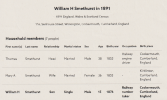-
Our booking engine at tickets.railforums.co.uk (powered by TrainSplit) helps support the running of the forum with every ticket purchase! Find out more and ask any questions/give us feedback in this thread!
You are using an out of date browser. It may not display this or other websites correctly.
You should upgrade or use an alternative browser.
You should upgrade or use an alternative browser.
1891 Census: Occupation - "Railway number taker"
- Thread starter weepingwillowb
- Start date
Sponsor Post - registered members do not see these adverts; click here to register, or click here to log in
R
RailUK Forums
Mcr Warrior
Veteran Member
- Joined
- 8 Jan 2009
- Messages
- 11,901
Does this old thread from 2016 potentially help/clarify?
Number Taker
Good Afternoon All My grandfather's occupation is listed as 'number taker' on the National Union of Railwaymen records from 1917. Please could someone tell me what work was carried out by a number taker? Many thanks. Best Wishes Jayne
www.railforums.co.uk
Gloster
Established Member
Numbertakers recorded the numbers of wagons, and sometimes coaches, arriving and departing stations and depots; there might be other duties, but they would be secondary. The information was then written down in ledgers and these were retained in case there was any dispute or statistics were needed. The railway created enormous amounts of paperwork, much of it merely being kept ‘just in case’. The birthplace and residence suggests that he worked for the London & North Western Railway (nothing to do with the current lot), but there are other possibilities, including the Railway Clearing House, a national organisation which regulated the interchange between different companies. Half of my job in 1978 to 1979 was still officially called Numbertaker and probably hadn’t changed much: I still wrote it up in ledgers.
weepingwillowb
Member
My thanks to you both for answering my question. Number taking seems to have been one of the railway jobs that gets little or no mentions in railway history, and no-one(?) writes a memoir recounting their experiences of number taking in the railways.
The details from the Number Takers, principally of goods wagons but also carriages and locos on occasion, went to the Railway Clearing House and was used for calculating various aspects of sharing revenue, and cost, between different companies. Obviously a junior role, for a 15 year old to be so employed. Mainly at done boundary points between rail companies.
As well as numbers, they also identified damage and thus charging whichever company was responsible for it, following all this by preparing in the office a range of documents. It was essentially a clerical role for those who could write (by no means universal in the 19th century). They normally had their own desk in an office. Very simplistically, it is what the TOPS computer system does on the railway nowadays.
As well as numbers, they also identified damage and thus charging whichever company was responsible for it, following all this by preparing in the office a range of documents. It was essentially a clerical role for those who could write (by no means universal in the 19th century). They normally had their own desk in an office. Very simplistically, it is what the TOPS computer system does on the railway nowadays.
co-tr-paul
Member
I covered quite a few number taker shifts at Bristol Temple Meads during 83/4 for TOPS. Professional train spotter !
weepingwillowb
Member
Thank you.

